At Almoosa Health Group, we are deeply committed to advancing excellence in medical education, research, and patient care. Our Academic Affairs division fosters a dynamic and supportive environment where medical students, residents, and fellows can thrive.
Central to our educational mission is our distinguished teaching hospital—a premier center for clinical training and innovation. Here, all physicians, nurses, and allied health professionals—whether current, incoming, or external—benefit from immersive, hands-on learning experiences led by a team of dedicated and highly experienced faculty members. Through integrated clinical practice and academic rigor, we aim to equip the next generation of healthcare leaders with the knowledge, skills, and compassion needed to serve patients and communities with excellence.
Explore our programs and discover how we’re shaping the future of healthcare—one learner at a time.
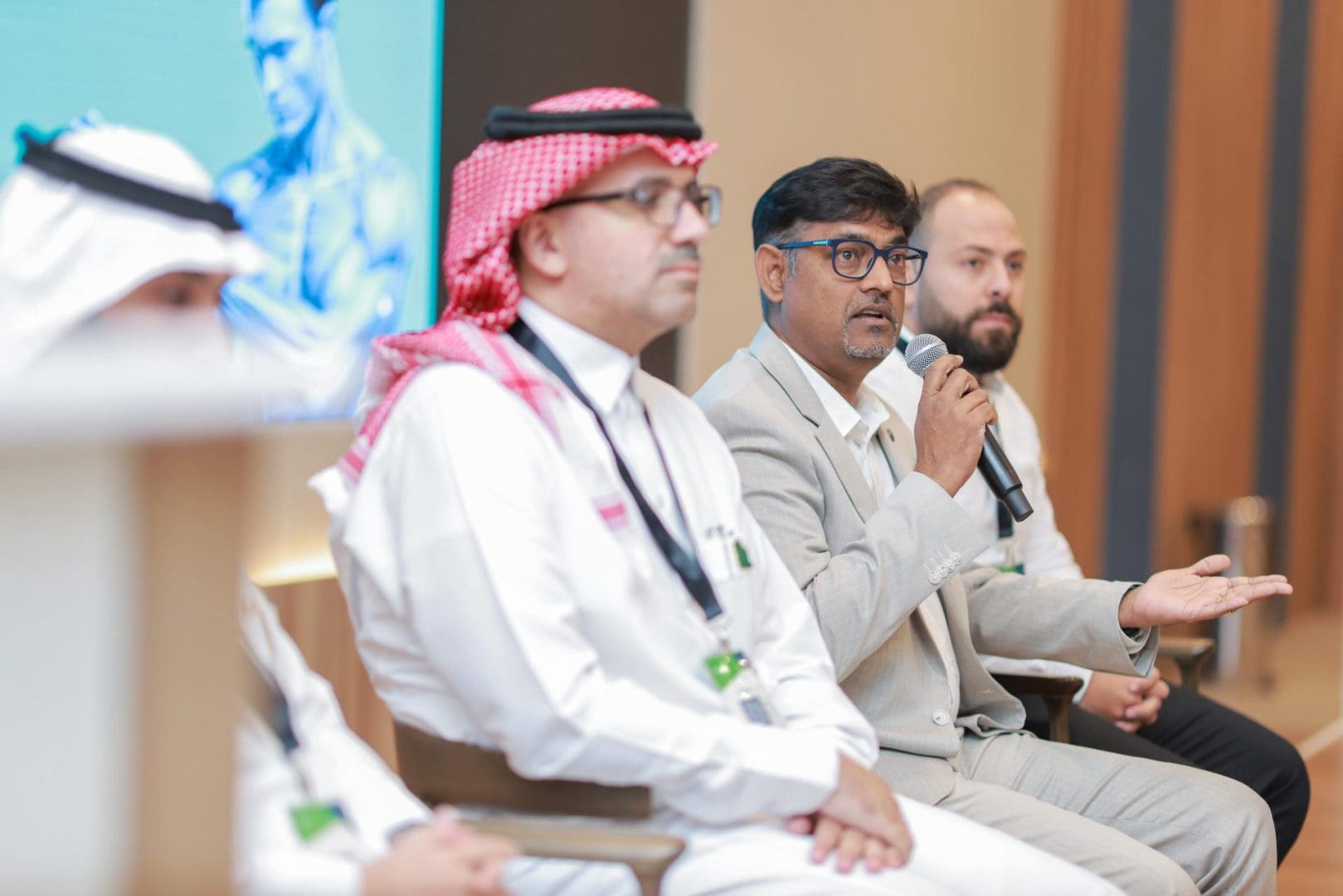
Research Center (RC)
The Research Center was founded to oversee the research activities at Almoosa Medical Group. It was established to identify key areas of research based on the health care needs of the society, to help to develop the Saudi research activities which can meet with the 2030 vision on research and development, and to encourage staff to contribute to those prioritized areas of research.
The center also maintains the ethical standards of practice in medical research through the Institutional Review Board (IRB) to protect both participants and researchers and ensure that interdisciplinary research is conducted in an appropriate and consistent manner. An Institutional Review Board (IRB) has been established at Almoosa Medical Group and goes under the umbrella of King Abdulaziz City for Science and Technology (KACST). The main aim of this board is to review studies ethically and make decisions whether to approve or reject a study. Research Center also offers continuous professional development programs in research methodology, biostatistics and scientific writing for publication as a sense of duty towards community, professionals and students’ development.
Activities undertaken by the Research Center:
- Clinical research proposal development assistance/consultancy
- Clinical research data collection
- Clinical data analysis
- Research paper publication assistance/consultancy
- Sponsored study feasibility assistance/consultancy
- Sponsored clinical studies.
Training Programs :
- All training programs have Saudi Commission for health specialties (SCFHS) accredited CME hours). The details of these courses are published online periodically.
- Course on Overall Research Overview.
- Research Methodology Overview.
- Almoosa Summer Research School (ASRS).
- Association and Causality in Clinical Research.
- Seminar on Clinical Research: From Conducting Research to getting it Published.
- Introduction to Qualitative Research Course.
- Biostatistics in Healthcare.
- SPSS without tears.
- Teaching EBM: A Two Days Workshop.
- Clinical Trial Course for Nurses.
- Teaching evidence-based medicine.
- Evidence based practice in rehabilitation medicine course.
Annual Symposium:
To foster a research community, the Research Center organizes the “Annual Applied Clinical Research Symposium” every year. It is one of the largest Clinical Research Symposiums in the Eastern Region to discuss the present and future perspectives of medical research in the Kingdom and provides unique opportunities to healthcare professionals and students to explore breakthroughs in research.
Continuing Professional Development Department (CPDD)
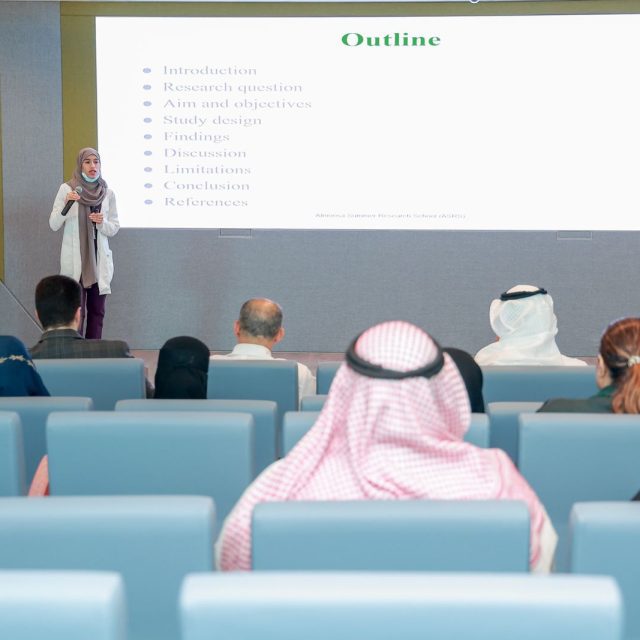
Continuing Professional Development Department (CPD) Enhances lifelong learning designed to support the growth and advancement of healthcare professionals, including clinical and non-clinical professionals and students. CPD ensures that healthcare team members continuously maintain, enhance, and broaden their knowledge, skills, and competencies in alignment with evolving healthcare standards, innovations, and patient care expectations.
CPD embraces a wide variety of learning methods to accommodate different professional needs and learning styles. These include workshops and seminars, online courses and e-learning modules, simulation-based training, on-the-job training and mentoring, conferences, webinars, as well as self-directed learning and reflective practice. These methods promote flexible, accessible, and practical learning opportunities that support both individual development and institutional goals.
To empower all learners, the CPD program provides a rich array of resources and infrastructure. Simulation labs and skills centers offer safe environments for hands-on practice and experiential learning. Learners also benefit from access to comprehensive knowledge repositories, including clinical guidelines, protocols, recorded lectures, and curated reading materials. Interactive learning tools such as case-based discussions, e-portfolios, virtual patients, and reflective journals foster deeper engagement and critical thinking. Additionally, the program ensures strong technical and academic support through help desks, CPD coordinators, orientation guides, and continuous learner support services.
Access to centralized learning platforms and learning management systems (LMS) allows learners to easily navigate structured courses and track their own progress. The involvement of qualified instructors and mentors provides expert guidance and constructive feedback. Protected time is allocated during working hours to support dedicated learning, while up-to-date learning materials and assessment tools such as quizzes, simulations, and portfolios help reinforce and evaluate learning outcomes. The organization also fosters a supportive culture that values continuous learning and professional development as integral to healthcare excellence.
The governance and evaluation of CPD are key to its quality and impact. Participation and progress are monitored regularly through dashboards and analytics. Quality assurance measures include periodic curriculum reviews, alignment with national and international standards, and incorporation of learner feedback. CPD activities are accredited, and formal certification is provided to support professional licensing, credentialing, and career progression.
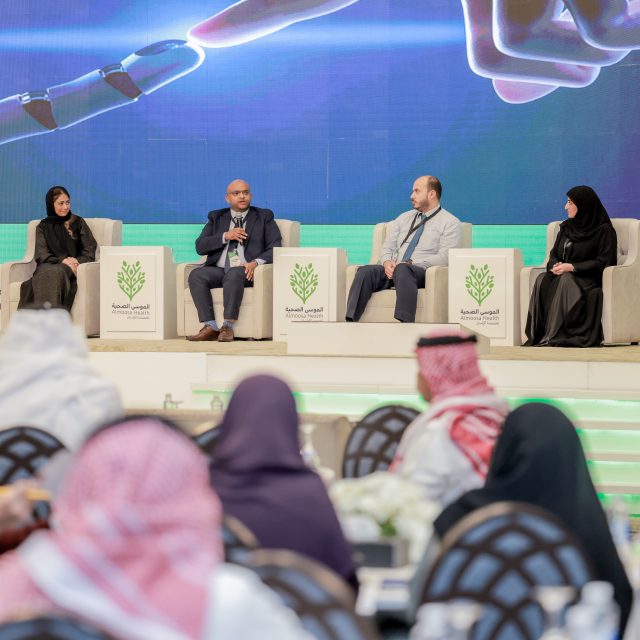
A Clinical Continuing Professional Development (CPD) is an accredited entity authorized by the Saudi Commission for Health Specialties (SCFHS) to design, organize, and deliver healthcare-related educational programs to all physicians, nurses, and allied health professionals—whether current, incoming, or external— Its primary role is to support the ongoing professional growth and competency of healthcare practitioners by providing structured learning opportunities aligned with SCFHS standards and regulations.
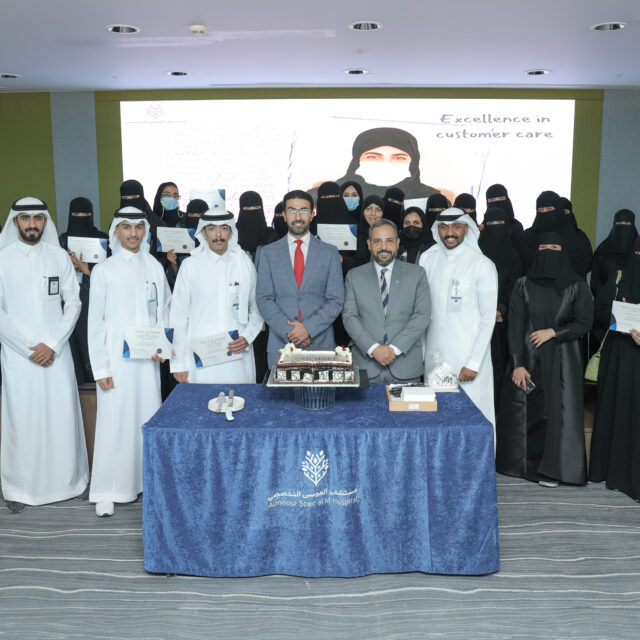
Training and Staff Development (T&D) unit is dedicated to enhancing the knowledge, skills, and competencies of Almoosa Health employees. Its core mission is to standardize professional responses and operational protocols, ensuring consistency and excellence across all levels of staff. The T&D unit aims to address current organizational needs while anticipating future challenges and demands. By fostering continuous learning and professional growth, it strives to elevate employee performance, support career advancement, and align individual development with the strategic goals of Almoosa Health.
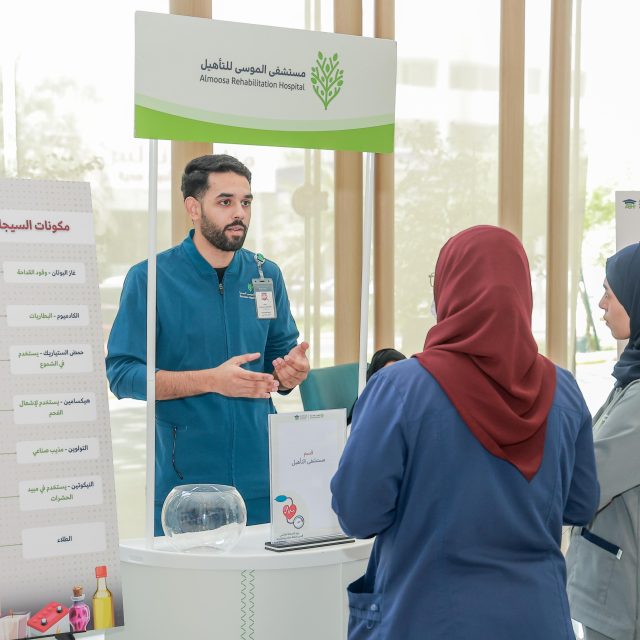
Patient, Family, Community Education (PF&CE) is dedicated to developing patient-centered, evidence-based educational programs and resources that recognize the vital role of patients and their caregivers in managing health beyond the walls of our institution.
The PF&CE works collaboratively with healthcare providers to ensure patients and families are equipped with the knowledge, skills, and confidence necessary to make informed decisions and actively participate in their care. Patient Educators deliver individualized education and skill-building sessions as requested by clinical staff, develop customized educational materials tailored to patients’ needs, and lead both indoor and community-based awareness campaigns. In addition, they organize and facilitate patient and caregiver support groups, discussion sessions, and other engagement activities aimed at promoting health literacy, emotional well-being, and self-management.
Through these efforts, the PF&CE fosters a culture of empowerment, empathy, and partnership in every stage of the care journey.
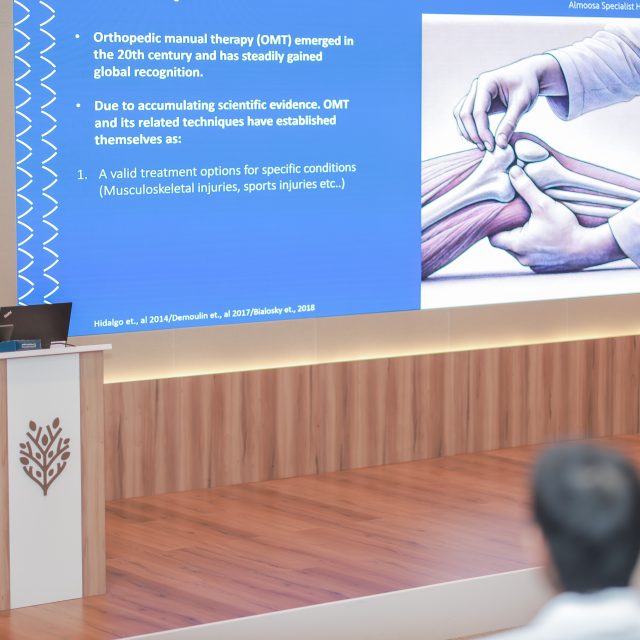
Almoosa Health is an accredited institution for Health Academy Programs; the Health Academy is under the Saudi Commission for Health Specialties. Its primary goal is to enhance the standards and quality of vocational health training, contributing to the localization of the health workforce and supporting the broader objectives of health transformation programs in Saudi Arabia. This initiative focuses on developing specialized skills, fostering local expertise, and aligning training with the evolving needs of the healthcare sector to ensure sustainable and efficient healthcare delivery.
Almoosa Health contains various programs such as: Patient Care Technician (PCT), Dental Assistant (DA), ECG Technician, Electroencephalographic Technician, Health Care Security, Orthopedic Technician, Clinical Coding, and CSSD Technician.
The Library is dedicated to enhancing the knowledge of Almoosa Health staff by providing a centralized, accessible hub of information. It ensures that staff can easily access resources from any location, whether in the clinic or at home, fostering a seamless learning experience. The Library is equipped with a diverse range of both physical and digital resources, complemented by modern PCs, to create an environment conducive to research, study, and professional development. Its comprehensive offerings support the continuous growth and informed decision-making of the Almoosa Health staff.
Life support center
ASH Life Support Training Centre (LSTC) is a signature project for education and training at Almoosa Specialist hospital and supports the strategic plan in the area of education, innovation, and collaboration. The ASH LSTC is an official American Heart Association (AHA) training Centre, offering the following life support courses: Heartsaver Provider and Instructor courses (First Aid, First aid-CPR, and First aid-CPR-AED), Basic Life support (BLS) Provider and instructor, Advanced Cardiac Life Support (ACLS) Provider and instructor, Pediatric Advanced Life Support (PALS) Provider and instructor and neonatal resuscitation program (NRP) Provider.
In addition, Almoosa Specialist Hospital is an official training center for Advanced Trauma Life Support courses for doctors (ATLS) and nurses (ATCN) in affiliation with the American College of Surgeons (ACS).
Purpose:
- Providing high-quality life support training programs for AlMoosa Specialist Hospital staff and the surrounding health care organizations to help them save more lives.
- Offering learning opportunities to enhance skills and help other Healthcare providers succeed in their career as part of the organization’s dedication to spreading the knowledge of how to save lives among the community.
- Ensure that the life support programs will be conducted according to the international guidelines and standards established by each association and conduct periodic review and evaluation on a regular basis to find any opportunity to improve.
Post Graduate Education
Almoosa Health Postgraduate Education Department offers a diverse portfolio of residency, fellowship, and diploma programs, all accredited and supervised by the Saudi Commission for Health Specialties (SCFHS). Our goal is to deliver high-quality academic and clinical training programs that foster excellence in healthcare education.
We are committed to creating an ideal learning environment grounded in the principles of education and professional development. This environment empowers both trainers and trainees, equipping future healthcare professionals with the knowledge, skills, and clinical judgment necessary for safe, competent, and compassionate practice.
Residency and Fellowship Training Programs
Residency training is a structured postgraduate program in a specific medical specialty, providing physicians with the hands-on experience required for independent clinical practice. Upon completion of a residency, some may pursue fellowship training to gain advanced expertise in a sub-specialty.
At Almoosa Specialist Hospital (ASH), the first SCFHS-accredited residency program was launched in 2017. Since then, our postgraduate training offerings have expanded significantly. We now proudly host 24 accredited residency and fellowship programs, each designed to meet national standards and address the evolving needs of the healthcare sector.
Residency Programs:
- Pediatric
- General surgery
- Obstetrician Gynecologist “OGYNE”
- Intensive Care Unit
- Internal medicine
- Radiology
- Anaesthesia
- Neurology
- Urology
- Orthopaedic
- Ophthalmology
- Family medicine
- ER
- Dermatology
- Pediatric Dentistry
Fellowship Programs:
- Adult Cardiology fellowship training program.
- Adult Gastroenterology fellowship training program
- Adult Endocrinology fellowship training program
- Adult Infectious diseases fellowship training program
- Neonatal Intensive Care Unit Fellowship training Program
- Pediatric Intensive Care Unit Fellowship training Program
- Neonatology Fellowship training Program
Diploma Program:
- Adult Critical Care nursing
- Clinical pharmacy
